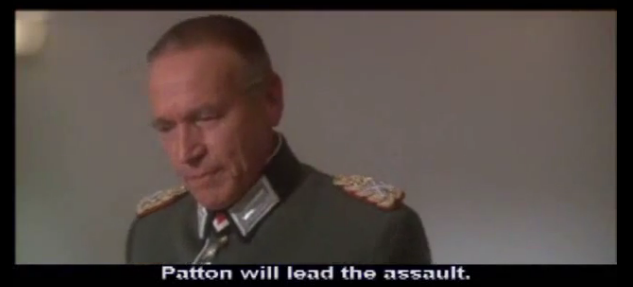
Posted on 03/10/2013 6:59:35 PM PDT by JerseyanExile
A Bridge Too Far is one of my favourite war movies. Pretty much the last of the Big Screen Epics, with an All Star Cast, it doesn’t try to do much except simply tell what happened. No romantic sub plots, no political commentary, it just goes all-out to bring us the story. There’s a scene near the beginning, where von Rundstedt and Model are discussing if they need to worry about stopping Patton or Montgomery.

“He’s their best. I’d prefer Montgomery, but Eisenhower isn’t that stupid” says von Rundstedt. The whole Monty/Patton argument in general is frequent, and shows up even in the Hatch forum (See the El Alamein thread).
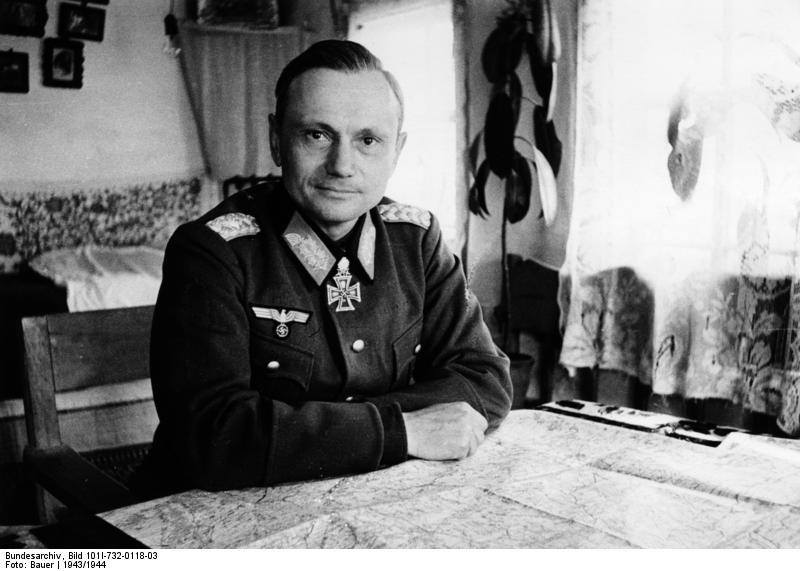
Now, this handsome fellow was a chap by the name of General der Panzertruppe Hermann Balck. By most accounts he was quite a competent chap, probably one of the best Panzergenerals the Germans had to offer. It is doubtful that many officers could have performed as he did in the Eastern Front. The Autumn of 1944 saw him in command of First Army, in central France. He had some issues to deal with. In a letter he wrote to von Rundstedt, he said “I have never been in command of such irregularly assembled and ill-equpped troops.” Certainly the German Army in October 1944 was not the same as it had been in 1941. His next sentence, however, bears some attention: “The fact that we have been able to straighten out the situation again and release the 3rd Panzergrenadier Division for the Northern front can only be attributed to the bad and hesitating command of the Americans and the French…” Later he said “Within my zone, the Americans never once exploited a success.” The unit facing him was US Third Army, the bad and hesitating commander he referred to turned out to be this fellow.

Yep, it’s George S. Patton Jr, the US’s best tank general of WWII. What’s going on?
When he was over to partake in Operation Think Tank, Harry Yeide gave me a copy of his new book, “Fighting Patton.” I love books like this. He completely ignores preconceptions, that which we know to be true simply because everybody knows it, and digs down to find the verifiable truth for himself. He said he was watching the movie “Patton”, and was intrigued by the German intelligence officer who kept the historical bio of the man. In this case, Yeide almost completely ignored the US writings, and instead went straight to the German war records and diaries of the people facing Patton to see what –they- were saying. It makes fascinating reading and throws a number of our preconceptions on their heads.

Now, I have somewhat mixed feelings about General Patton. The US Army has seen fit to name its museum of leadership after him, but while he may have been a great leader, I (please ignore the soap box under me) have something of a belief that his style of leadership belongs in a museum and there may be better role models for today’s young officers. The authoritarian style is something of an anathema to what I have seen work, but then, I work with 21st Century soldiers, not ones from 1940s. For current purposes, my opinion on this is irrelevant: What counts is what 1940s Patton did with his 1940s soldiers against 1940s Germans, Italians and French. Well, he led them to victory. What's interesting, though, is the perception of how he did it and of what people thought of him.
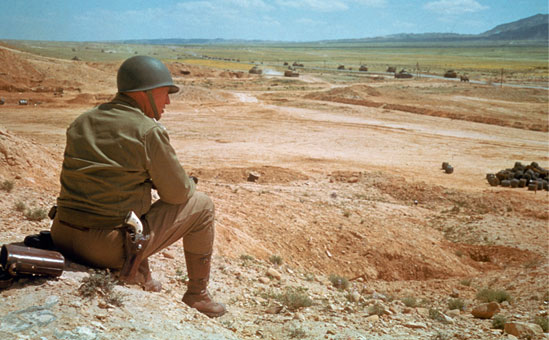
By and large in North Africa, the Germans not only had no clue who this Patton fellow was, they pretty much didn’t care anyway. The records show that their focus was Montgomery, the forces in the West facing the Americans basically had to work with whatever the Axis forces had to spare after taking Montgomery into account. Who the American commander was was somewhat irrelevant to them. Move to Sicily, and the great dash to Palermo didn’t impress the Germans either: They had voluntarily abandoned the territory. The reason why Montgomery was slow while Patton was able to loop around the island at high speed? The Germans had moved all available forces from the West to stop Montgomery, they didn’t care about the West of the island. After all, their escape route was to the East. And then they discovered, to somewhat their surprise, that the Allied advance was so hesitant that they were able to get most of their men and heavy equipment off the island, which they hadn’t thought would be possible when they started the Sicily defence. The name “Patton”, however, still didn’t seem to mean much to them.
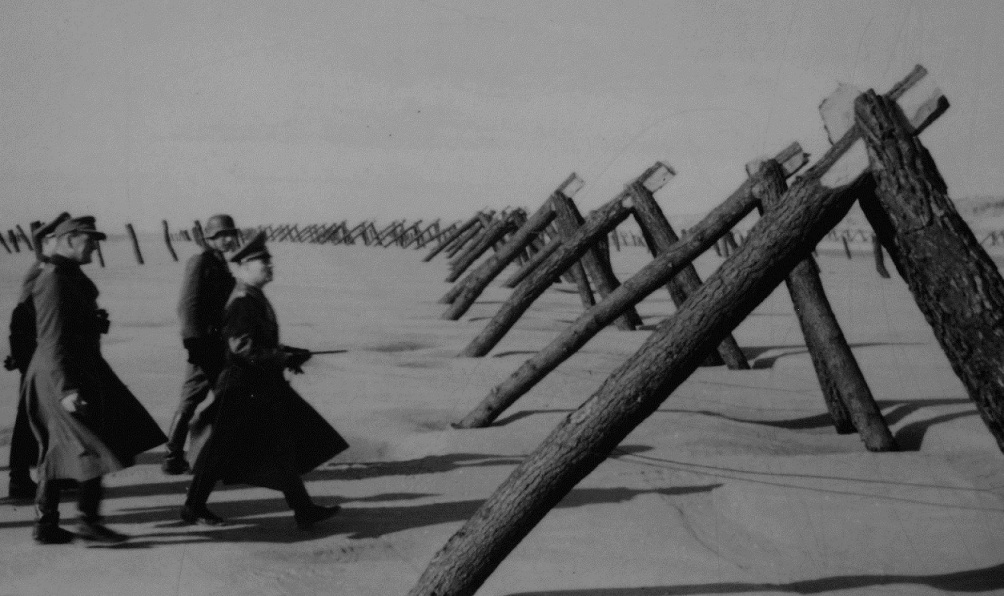
Ok, we move on. Patton is beached for a while, as we know, and then put in charge of FUSAG, the fictional unit supposed to invade the Pas de Calais. The common story is that the Germans were so in awe of Patton that they were convinced that wherever he was, that’s where the main invasion would be, and that may have been the intent. Problem seems to be that most German officers had never heard of the man at that point. Just because the US newspapers or General Eisenhower may have thought the Germans feared Patton doesn’t mean that the Germans felt the same way! That they were worried about FUSAG is pretty much a given, but they were worried about a supposed huge body of men and equipment. It could have been commanded by General Snuffy, as far as they cared. When he does move to the continent and takes over the US Third Army, the Germans had already decided to withdraw to the German border, and the race across France actually took about four weeks longer than the Germans had anticipated it would. And while they were doing it, the primary focus of the Germans was, again, Montgomery. Units facing Bradley (and thus Patton) generally had to make do with what was left over. There seems to have been no "Patton Panic" in the German Army.
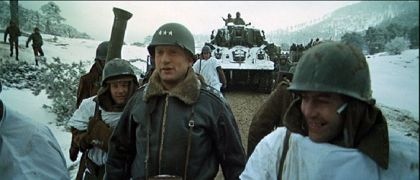
There’s a scene in “Patton” where the various allied officers are having a chat with Bradley about the German Ardennes offensive. Patton (George C Scott, of course) stuns the assembled men by announcing that he can have elements of his Army make a left turn and head for Bastogne in three days. All very impressive. German records for the planning of the Ardennes expedition indicate that they expected an attack from the South a little faster than that. And by the time Patton had actually gotten his forces to the fight, the German offensive was already considered a lost cause by the Germans. The commander of the forces which actually stopped the offensive? Field Marshal Bernard Law Montgomery overall, and General Courtney Hodges with his First Army in particular.
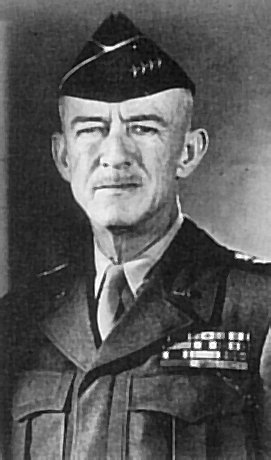
Now, I’m going to go off-track for a second here. Whatever the merits of Patton, Hodges is someone who probably deserved to have a movie of his own. He joined the Army as a private only three years before Patton commissioned as a lieutenant, yet was his equal under Bradley in the French campaign. His First Army undertook some of the most significant fighting of the Western front, but it seems that few people have even heard of him. If you get the opportunity, he might be worth a little personal research. To a large extent, this demonstrates the folly of the Monty/Patton argument: In France, Montgomery and Patton were not even competitors, except perhaps for press coverage. Montgomery’s counterpart was Omar Bradley, Patton’s counterparts as Army commanders were Hodges, Simpson, and Gerow. How many Patton/Hodges arguments are there on the Internet?
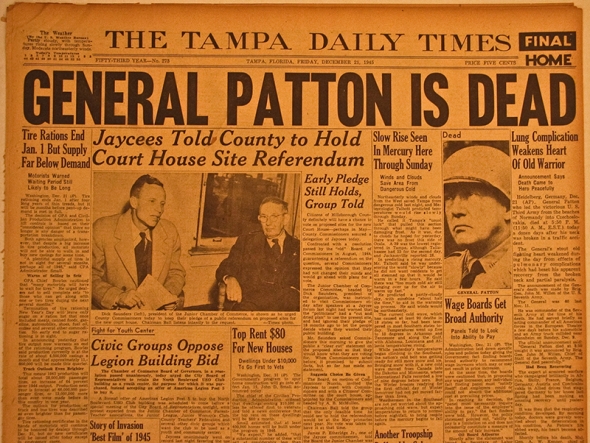
Now, I’m not saying that Patton didn’t have his good points. When he knew he was free to advance, he did so with a speed that few could, or would, match. His philosophy of offence above all else is matched by some of the most successful generals out there (although, granted, it worked for Custer as well during the US Civil War, and we know how that ended up afterwards), and he was a senior commander on the winning side so he must have had merit. “Fighting Patton” is a 500-page opus, almost 20% of which is supporting notes and references, and Yeide reports both the praise that the Germans gave Patton as well as their criticism. It really is worth the read. Fundamentally, Patton was the US Army’s best tank general in WWII in a field of… erm… Quick! Name a US ‘tank general’ in WWII other than Patton? And to crown off the mythology and seal his fame, he died tragically. That, colorful and competent, there’s little wonder he’s the US’s most famous general of the time, if not ‘ever.’ To the Germans, though, he was pretty much just another general, not anyone to take really significant note of.
The point of this all, though, is one which I try to make repeatedly. Take conventional wisdom with a grain of salt. For example, there’s nothing wrong with being slow and methodical as a commander when you can afford to be, a trait commonly associated with Montgomery. Which is fortunate, because that’s how a good number of German officers described their opposition, which turned out to be Patton. (“Hesitant “and “missing opportunities” was another common description, mind). And, of course, Patton never faced the ultimate test of conducting a fighting withdrawal. We know that Patton was a commander worthy of praise, the Germans credited him for it when they felt it was deserved. But Harry Yeide went further, took the initiative and effort to challenge the “US side of the US story” and look into the background, only to reinforce that the truth as we know it may not be the whole truth. Good for him, and may he continue.
Why?
“October 1944 .... hesitating command of the Americans and the French…” Later he said “Within my zone, the Americans never once exploited a success.”
Wasn’t that about the time the 3Rd Army was running out of fuel?
Patton was the real deal and the Germans knew it. He only had a couple of minor foul ups. He sent a way too small column to capture the prison camp his Son-in-Law was in. The whole effort was a foul up from the get go.
Also Patton was held up a little longer than he though he would be at Metz.
I have seen an interview with a German General, I can’t be sure if it was Von Rundstedt but he was in an English prison at the time. He was asked who were the best Allied generals and he simply said Patton and Montgomery. Who he thought were the least effective were Bradley and Clarke.
Our major contribution to the European War was supplying the Red Army with the transport to out run the German Army to Berlin. Strategically our overall plan was sound, we would have been in a cul-de-sac in Nothern France if we invaded there before 1944. Late 1942 and 1943 we, with the Brits, cleared the Mediterranean front, knocking out Italy. creating a 3rd front there.
We were careful after D-Day for the reason that the Germans had interior supply advantage despite air superiority. Patton may have been correct that he could have punched passed the German west wall in September, but he still would have exposed the flank has the northern front was stuck. (The Bridge Too Far put paid to any more daring thrusts for the duration.)
But it was a political blunder that the Western Allies didn't press on in Germany and move farther East when it was wide open in April to create a military accomplished fact given Stalin reneging on earlier agreements.
One of Patton's major accomplishments with his so-called authoritarian leadership style, was that his Third Army suffered the lowest rate of casualties of any unit of similar size and combat engagement.
His "authoritarian" training, expectations and discipline saved lives and as one survivor of Bastogne told me personally they were all really glad to see Patton when they were relieved.. He never knew or mentioned anybody else. And he didn't get Patton's name from the Sunday papers or the movies, like this joker.
I have to ask, where are you going with this post? I mean it’s interesting, but there must be an agenda here.....which is fine....just wondering what it is.
Where did this garbage come from. What is the Chieftians Website?
Looks like a place for kiddies to play study of war and buy video games.
My father was attached to Patch’s Army and the 3rd Army and was camped accross a lake from Patton’s headquarters. His impression of Patton was not from some history book he was there and saw him regulary. Near Bad Tolz Germany & Bad Wiessee Germany.
He to this day has nothing bad to say about the “bull” Patton. And nothing good to say about the arrogant “Monty”.
At 19 my father carried a M1 across parts of Europe. He was an armorer, worked on Quad 50’s and Bofors.
At 87 he is still a tough cookie. We talk daily about the insanity of the Commie B_tards who are taking over our nation. The fire is still in his belly and his eye.
I can assure you that he would straighten you out about what George Patton WAS.
I believe that some folks would make the case that Patton basically used blitzkrieg tactics — and that he did blitzkrieg better than the Germans did blitzkrieg. Perhaps some Germans didn’t like to admit that.
One thing Patton did which I have not seen reported very much is he worked his staff extremely hard. He would make them produce a complete set of battle plans for 3 or 4 different scenarios.
Then when the combat began he already would have made provision for what happened and how to respond.
Luck.
He was not in the Philipines when the Japanese attacked.
“But it was a political blunder that the Western Allies didn’t press on in Germany and move farther East when it was wide open . . . given Stalin reneging on earlier agreements.”
Calling it a “blunder” is akin to saying that President Ubama made a “blunder” by supporting blood thirsty anti-American Islamists during the so-called “Arab Spring.”
Both were deliberate political decisions made by socialists that had predictable outcomes against the best interests of our nation.
IMHO
Oldplayer
Excellent Post!!
I had a great uncle who served under Patton; that same uncle said he would follow Patton anywhere to fight anyone.
Why anyone should imagine their judgments regarding the quality of one of our generals or another should be respected is a good question.
A German Error of major consequence ~ how to build tanks. The Germans built large tanks and effective tanks ~ but yet they built them slowly since they'd decided to hand the work over to folks who usually built locomotives.
The Allies made use of automotive manufacturing capability ~ people who built trucks ~ and they could produce tanks, or chassis for use in Russia, quite rapidly.
In the end the best of the big German tanks proved totally inadequate. The Allied tanks were a stupendous success.
My dad and General Christmas regularly flew to various cities throughout the American heartland as the General saw to the production and deployment of tanks and other American rolling stock for the war ~ you almost never hear of General Christmas ~ BTW, there were two of them ~ the guy meeting with company engineers and executives in Detroit, Indianapolis, Chicago, St. Louis, Louisville, etc. was actually far more relevant to what went on in Europe ~ and Russia ~ than Patton or any other field general.
That's why he got to hop around in the most luxuriously appointed and capable aircraft owned by the US government ~
They also had this legitimate grievance against the Germans who'd just knocked down 60% of all standing structures in what used to be called the USSR.
Eventually Stalin died, a series of apparatchiks of questionable talent followed, and in the end we got to see Boris Yeltsin on TV writing decrees that dismantled that structure and put the Russians on a different path.
Maybe that could have happened earlier with a deeper Allied advance from the West, and maybe it couldn't.
A lot of that blood could have been avoided if they had a different ruler....The Soviet Union won, in spite of Stalin.
As for Patton, the German general F.W. von Mellenthin in his memoir PANZER BATTLES praised Patton as a man who “could think along big lines”. Remember too that Patton would have made even more progress if so much material support had gone to fiascoes like Market Garden.
Disclaimer: Opinions posted on Free Republic are those of the individual posters and do not necessarily represent the opinion of Free Republic or its management. All materials posted herein are protected by copyright law and the exemption for fair use of copyrighted works.